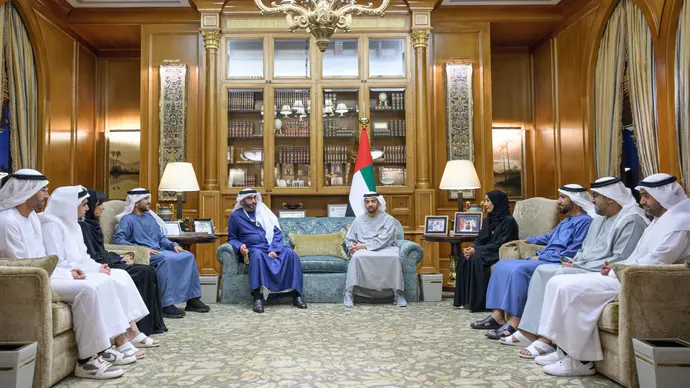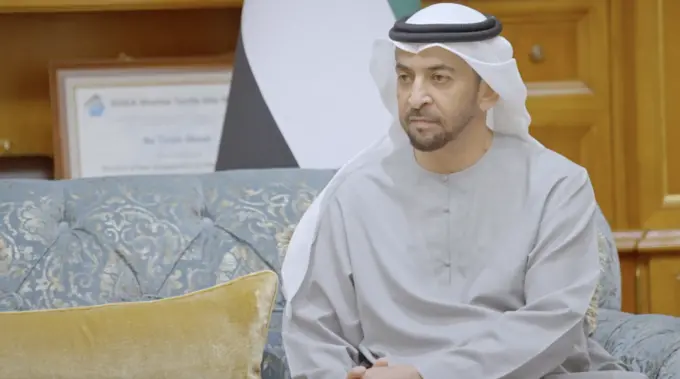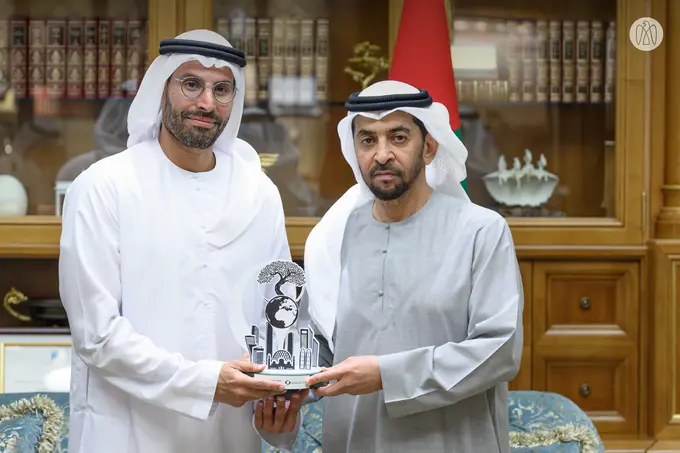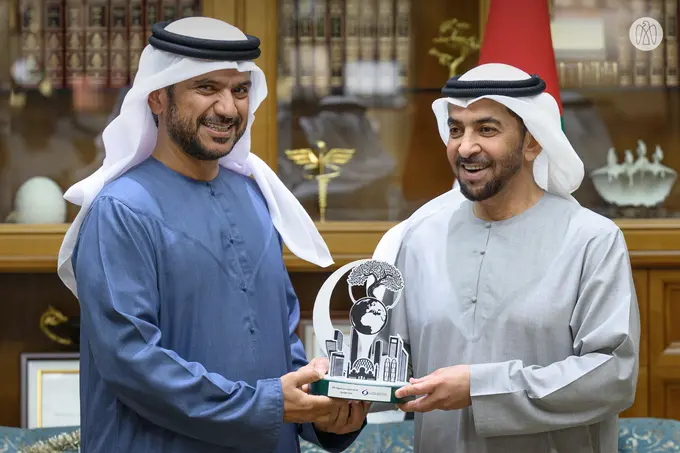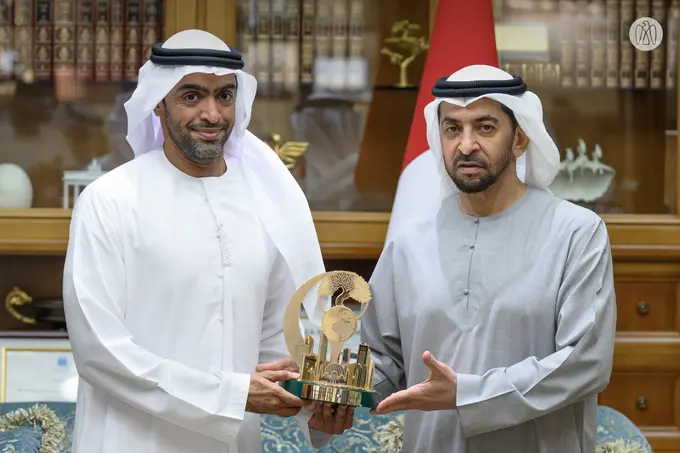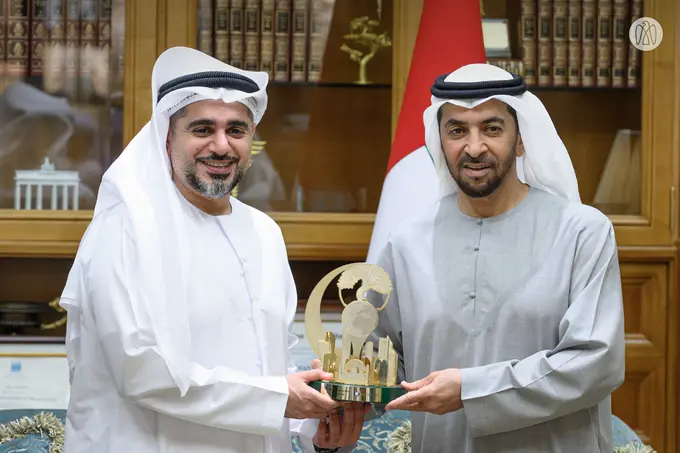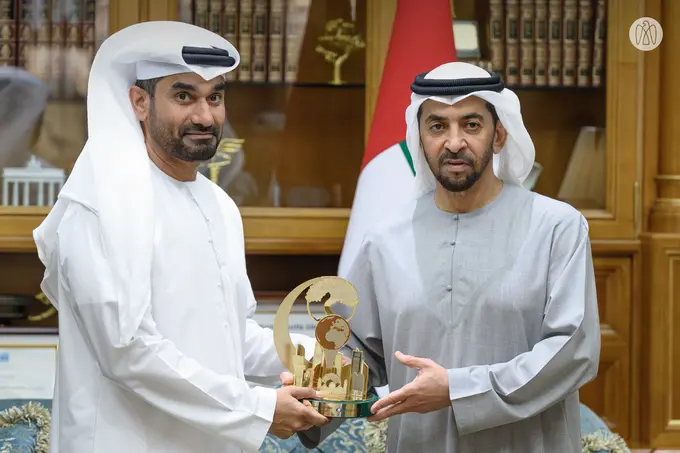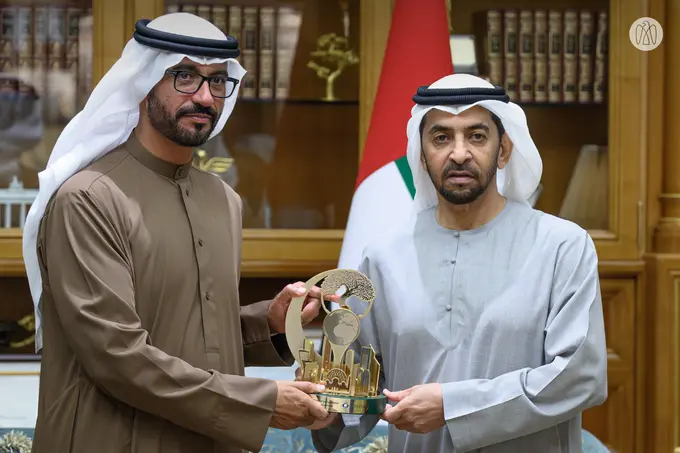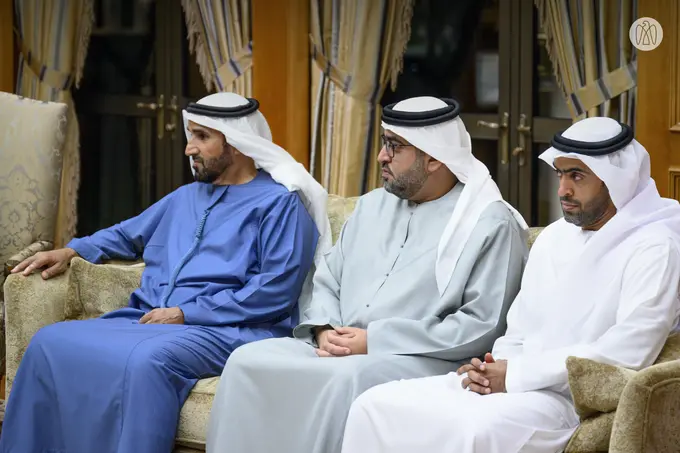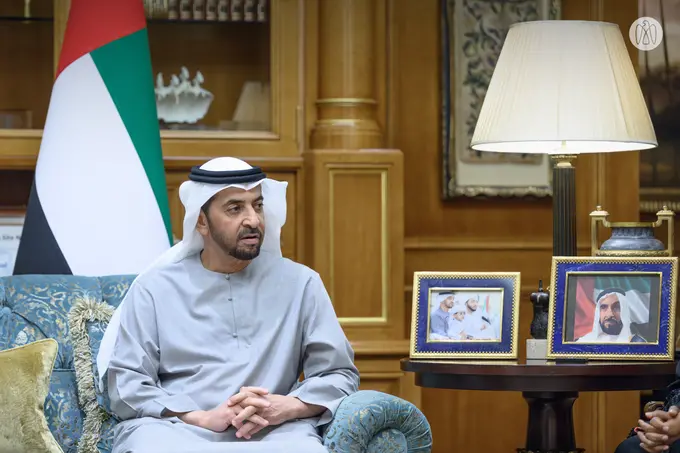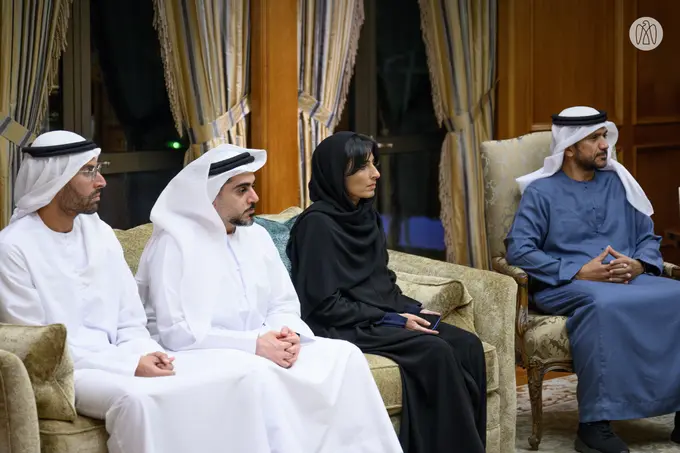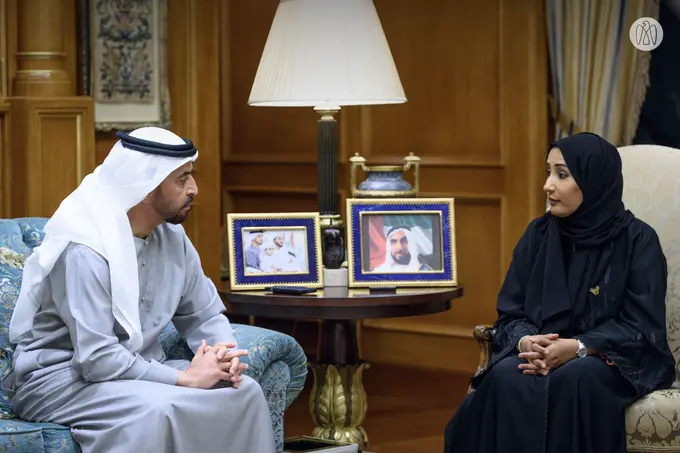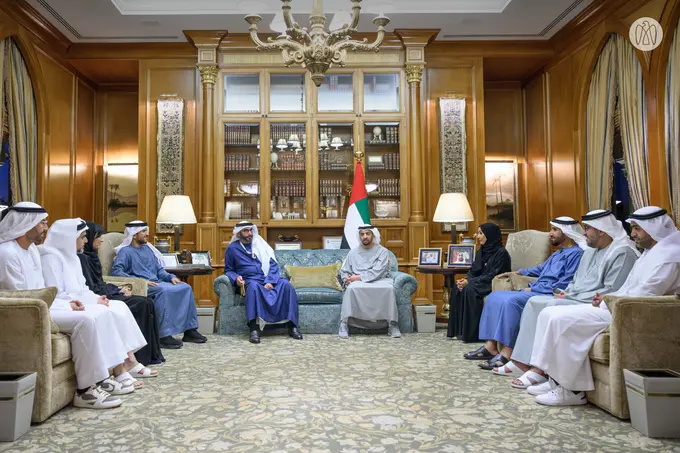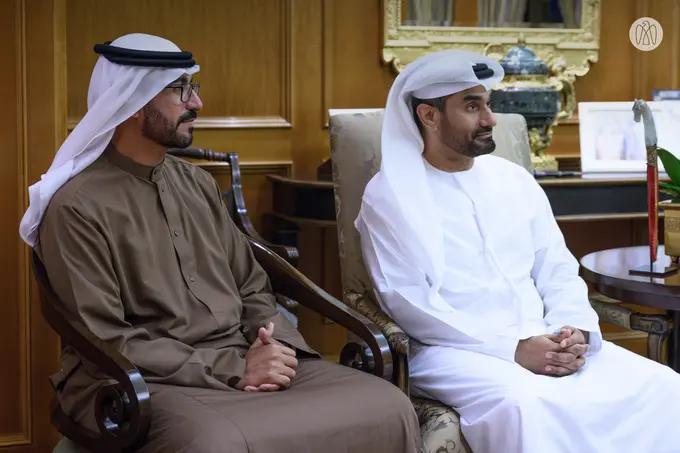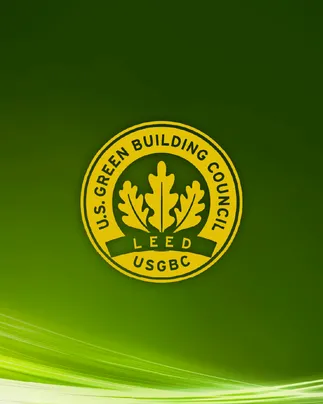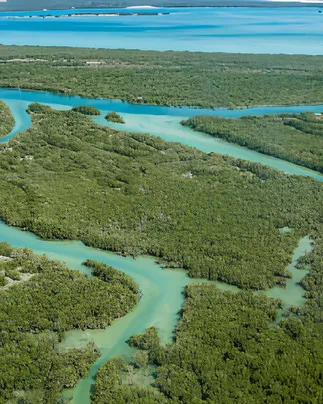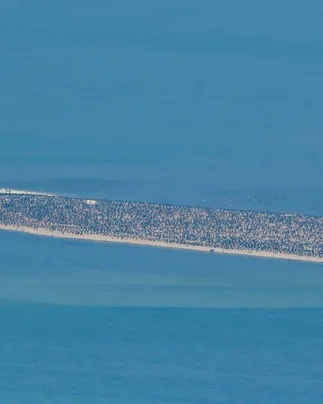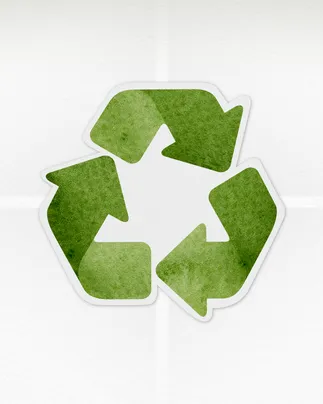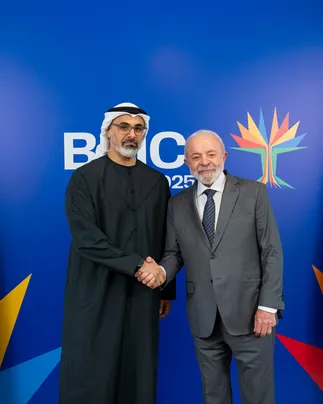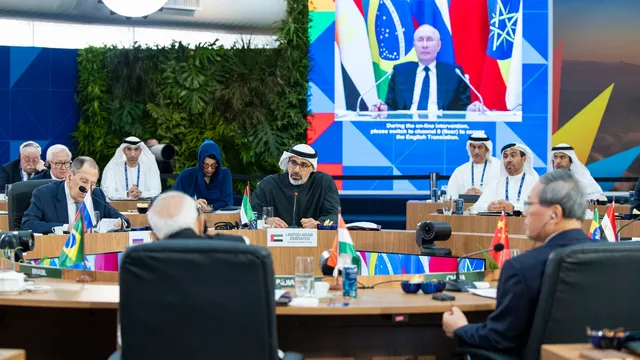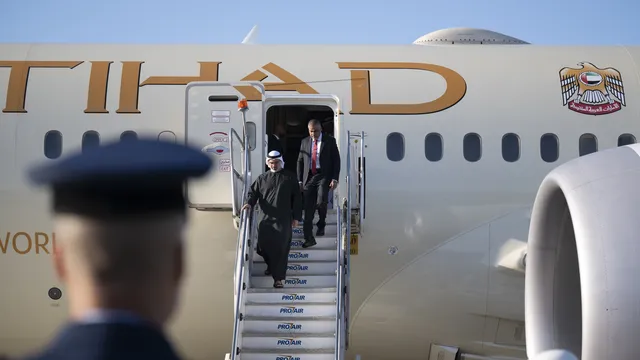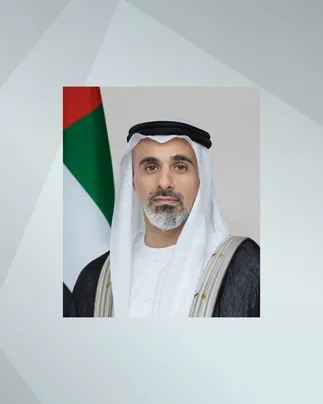His Highness Sheikh Hamdan bin Zayed Al Nahyan, Ruler’s Representative in the Al Dhafra Region and Chairman of the Environment Agency – Abu Dhabi (EAD), honoured the heads of government agencies that support the achievement of the goals of the Environmental Centennial 2071.
The reception took place as part of EAD's role in leading the development of the Environmental Plan towards the Centennial – a multi-agency three-year programme launched earlier this year that aspires to make Abu Dhabi the world's leading city in environmental and climate action by the year 2071.
The ceremony was attended by Sheikh Mohammed bin Hamdan bin Zayed Al Nahyan, Her Excellency Dr. Amna bint Abdullah Al Dahak Al Shamsi, Minister of Climate Change and the Environment, His Excellency Mohamed Ahmed Al Bowardi, EAD's Vice Chairman, His Excellency Eng. Awaidha Murshed Ali Al Marar, Chairman of the Abu Dhabi Department of Energy, His Excellence Mohamed Khalifa Al Mubarak, Chairman of the Department of Culture and Tourism of Abu Dhabi, His Excellency Staff Major General Pilot Faris Khalaf Al Mazrouei, Abu Dhabi Police Commander-in-Chief, His Excellency Mansour Ibrahim Al Mansouri, Chairman of Department of Health – Abu Dhabi, and His Excellency Ahmed Jasim Al Zaabi, Chairman of Abu Dhabi Department of Economic Development.
The ceremony was also attended by His Excellency Ahmed Matar Al Dhaheri, Director of the Office of the Ruler’s Representative in Al Dhafra Region, His Excellency Fahed Salem Alkayyoomi, Undersecretary of the Department of Government Enablement - Abu Dhabi, Her Excellency Razan Khalifa Al Mubarak, Managing Director of EAD, His Excellency Khadim Abdulla Al Darei, Advisor at the Court of the Ruler's Representative in Al Dhafra Region, Her Excellency Dr. Shaikha Salem Al Dhaheri, Secretary General of EAD, His Excellency Saeed Al Bahri Salem Al Ameri, Director General of Abu Dhabi Agriculture and Food Safety Authority and His Excellency Musabbeh Al Kaabi, Executive Director of Low Carbon Solutions and International Growth Directorate at ADNOC.
Participating in implementing the first environmental centenary plan 2071 are the Department of Municipalities and Transport, Department of Culture and Tourism, Department of Energy, Department of Government Enablement, Department of Economic Development, Abu Dhabi Agriculture and Food Safety Authority, Abu Dhabi Center for Public Health and the Integrated Transport Centre.
According to His Highness Sheikh Hamdan bin Zayed Al Nahyan, based on the announcement of His Highness Sheikh Mohamed bin Zayed Al Nahyan, UAE President, to extend the Year of Sustainability to include the year 2024, nine government agencies will lead environmental sustainability actions as part of the plan’s implementation and ongoing efforts to protect the emirate’s rich environment and achieve sustainable development. His Highness stressed the importance of implementing plans to achieve the desired results, which will further position Abu Dhabi, and the UAE as a country at the forefront of environmental sustainability.
His Highness praised the Agencies environmental sustainability efforts, which are aligned with the government's strategy. The activities also reinforce the sustainable development and prosperity in Abu Dhabi and the UAE, while fulfilling the vision of the founding father Sheikh Zayed Al Nahyan, which today still guides our wise leadership.
Her Excellency Dr. Shaikha Salem Al Dhaheri, Secretary General of EAD, said: “In 2022, EAD launched the Environmental Centennial 2071 for Abu Dhabi, which is based on the principles of cooperation, integration, and future foresight, through which the Agency leads the emirate’s environmental sustainability agenda and seeks to achieve the ambitious aspirations of Abu Dhabi Government to be a world leader in terms of conserving the environment.”
Her Excellency indicated that the Agency has worked with its strategic partners to realise this vision and achieve the goals of the Environmental Centennial 2071 through flexible planning cycles that take into account future changes. “We have developed the first round of the Abu Dhabi Environmental Plan towards the Centennial, which extends until 2025, to implement our centennial pathways. The plan includes 65 implementation programmes, and will help achieve more than 30 environmental and sectoral indicators, with a focus on results and enhanced cooperation, and stimulating the emirate’s green future transformation, toward reaching the goals of the 2071 Centennial.”
Her Excellency added: “These three strategic pathways aim to preserve Abu Dhabi’s unique natural gifts of biological diversity, clean air, water and soil that support various forms of life, and set proactive vision of addressing climate change in line with the UAE ambitious vision to achieve climate neutrality by 2050. This will be done by adopting sustainable development solutions, accelerating the adoption of green policies, increased environmental educational and awareness innovative initiatives, and advancing in environmentally-friendly science and technology. With this plan, we are emphasising the importance of working jointly to build a future that celebrates the beauty of our planet and the rich environmental heritage of our emirate.”
Seven government agencies are participating in the plan’s first pathway, vibrant emirate, thriving in nature, comprising 23 implementation programmes that will be implemented with a focus on protecting biodiversity, sustainable fish farming, and nature banks to preserve the genetic diversity of plants, seeds, and soil. Efforts will continue to recover damaged marine environments, such as coral reefs and seaweed. Through the use of advanced technology systems, planting mangroves and the monitoring and controlling of marine organisms will be expanded. This pathway also includes supporting environmentally-friendly tourism, via development of Abu Dhabi's sustainable tourism strategy, and green tourism experiences that enable visitors to explore the natural world through innovative ways.
To ensure a healthy future and cleaner air, there will be a shift to micromobility through the adoption of policies, plans and infrastructure that support light sustainable means of transportation. The capabilities of air quality modeling will be further developed through the integration of innovation, and to achieve immediate monitoring of factory emissions, chimneys will be electronically linked with the integrated system of environmental data monitoring in the emirate. To safeguard water and soil that supports life and prosperity, a road map for sustainable agriculture will be developed, and water demand management will be strengthened. A general framework for biosecurity will also be adopted, and an environmental health strategy will be implemented at the emirate level by developing the environmental health database and launching community awareness programmes.
The second pathway, entitled green force resilient to climate change, will see the participation of eight government agencies that will implement 19 implementation programmes. This pathway aims to achieve excellence in climate action through Abu Dhabi’s Climate Change Strategy, which was launched recently. It aims to achieve climate leadership by reducing emissions from key sectors, improving resilience to expected impacts, while maintaining investment attractiveness, and the creation of a low-carbon economy that promotes innovation.
A framework for future energy policies and a climate-smart transformation programme for the food and agriculture sector will also be launched, as well as the integration of climate change principles in city planning and urban policies and strategies. To preserve our unique natural environments, plans will be developed that ensure biodiversity adapts to climate change.
To transform into a global centre for clean and renewable energy, efforts will be undertaken to achieve leadership in green hydrogen, develop a low-emission vehicle strategy, and integrate environmental sustainability into the Abu Dhabi autonomous transportation strategy. To achieve a green economy that drives development, green government procurement will be encouraged, and air purification towers will be installed at various locations – acting as icons of sustainable architecture in the emirate and the world. Sustainable buildings will also be enhanced with updated requirements, the circular economy framework will be adopted in manufacturing industries, and a comprehensive strategy will be drafted to reduce food loss and waste as part of efforts to achieve a circular economy in the emirate.
In the third pathway, enablers for future environmental leadership, five government agencies will participate in implementing 23 implementation programmes that focus on enhancing Abu Dhabi’s environmental leadership. Education, training, and scholarship schemes for government employees will be launched to inspire environmental action, and everyone will have the opportunity to join the green e-learning platform, which provides rich environmental knowledge.
Initiatives will also be undertaken to discover the rich history of the natural environment, such as oasis, soil, geology, and hydrology sciences, and to support future planning. Due to industrial development key role in economic prosperity, EAD’s recently launched green factories voluntary eco-label programme will be further strengthened, recognising industrial institutions that implement environmentally-friendly operations.
To guide sustainable policy making, an integrated decision support system will be developed by combining inputs from the environment and other development sectors, a digital hub for community engagement in policy will also be launched, along with platforms for environmental, agricultural and food data. environmental cultural creative content will be promoted, and environmentally-friendly publishers will be celebrated. Prizes will be launched to encourage sustainable behaviours and for the adoption of sustainability guidelines in sectors such as hospitality, events, and travel. Research and innovation will also be enhanced through the Abu Dhabi Environmental Research Network and the EAD research vessel Jaywun.


